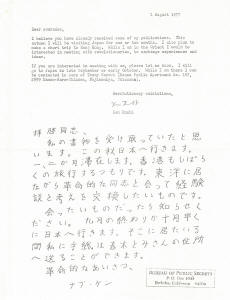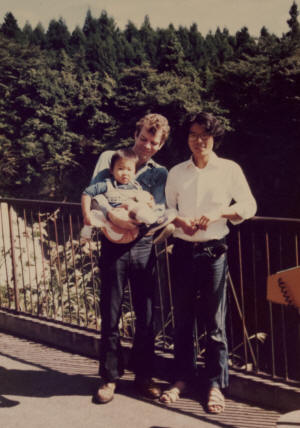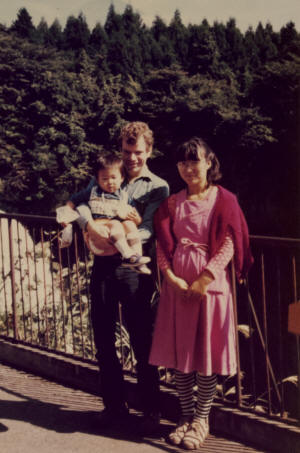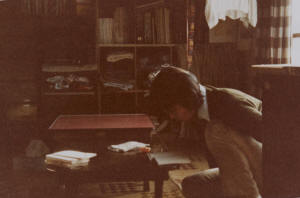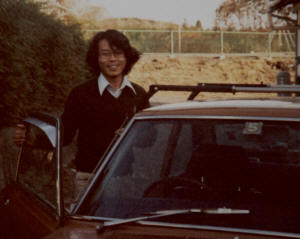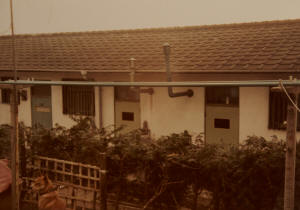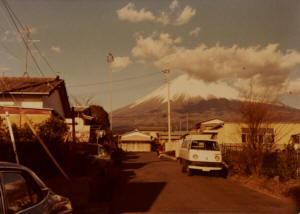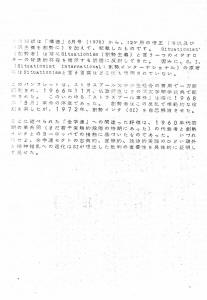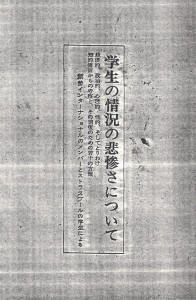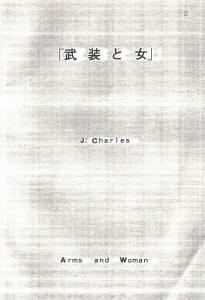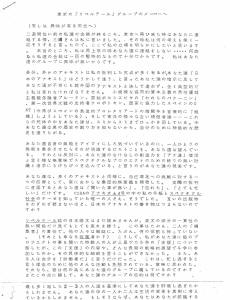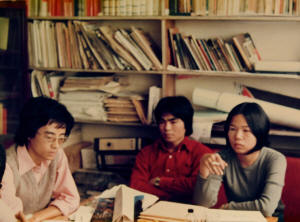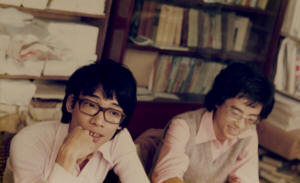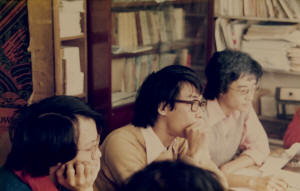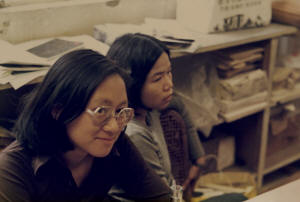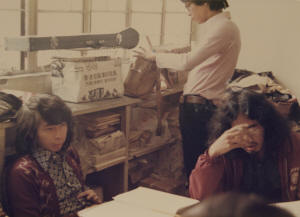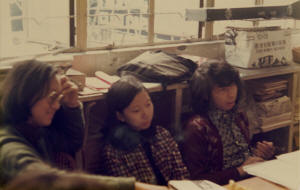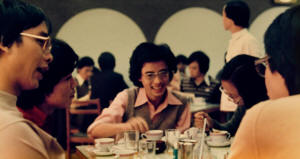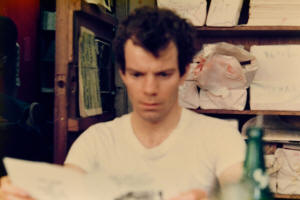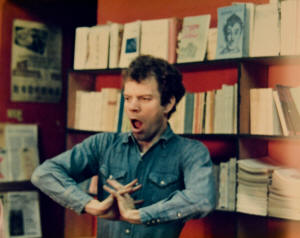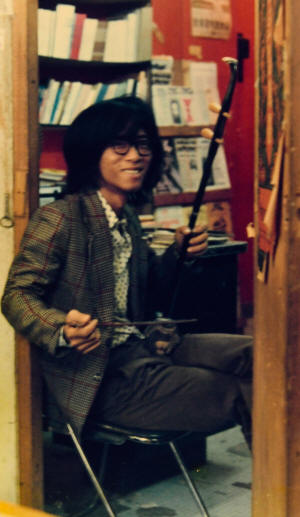TRAVEL DIARIES
Fall 1977
(Japan and Hong Kong. Ten weeks.)
In 1975 a Japanese anarchist named Tommy Haruki wrote to me, and our subsequent correspondence and the texts I sent him caused him to become very interested in the situationists. He also sent me some very interesting publications by an anarchist group in Hong Kong called the “70’s Front,” and I also began corresponding with them. Meanwhile, in early 1977 there was a break between Daniel and Françoise Denevert and our Bay Area “Notice” group, followed by an even more traumatic breakup of the latter group. Finding myself suddenly estranged from several of my closest friends and unsure of what to do next, I decided that this would be a good time to do the Japan-Hong Kong trip I’d already been thinking about.
In preparation, that summer I took a three-month intensive course in written and spoken Japanese at UC Berkeley. The class met five days a week for several hours a day, and I got completely wrapped up in it. The written language is difficult but fascinating, and it was also fun being able to converse with visiting Japanese students, though they were of course far better at English than we were at Japanese. Now, alas, I’ve forgotten almost all the Japanese I knew, but at the time I was immersed in the language and could carry on at least some conversation with native speakers, and I learned enough of the written language to be able to write this very elementary bilingual letter to my Japanese contacts:
Then I flew to Tokyo in early October. I did not keep an actual diary for this trip. I now wish I had, but at the time I thought that it would be simpler and accomplish most of the same purposes to write fairly detailed diary-style letters to some friends back in the Bay Area. These letters, reproduced below, were sent to Dan Hammer and Jim Brook, c/o Linda Hatch, a friend who was subletting my Berkeley cottage while I was gone.
OCTOBER 11-22
Dear Linda et al.,
Early morning. I’m up while the others are still asleep.
Haruki and a friend, Iwasa, met me at
the airport. We went to a café in downtown Tokyo and rapped a few hours — able
to communicate, but slowly due to our broken command of each other’s languages.
I won’t go too much into what we’ve talked about then and since. Obviously on my
side there have been various explanations and anecdotes about situationists.
From Tommy many stories from his past experience — student movement, anarchist
period, encounters with 70’s Front, etc.
We left Iwasa, who lives in Tokyo,
and took a bus to Fujinomiya. It’s a quiet country town that resembles the
French countryside somewhat — small streets, gardens. Tommy lives with his wife
Yoriko and two small sons in a house about the size of my cottage [i.e. about 350
square feet]. Since everything is kept real neat and in its place, it
doesn’t seem as crowded as one might think.
I’ve tried to talk to Yoriko a bit, but it’s very difficult
since she understands almost no English. Mainly I’ve talked with Tommy about
everything that we can think of. I really like him a lot.
My first evening here we went into town to a public bath,
which was nice. Then had a delicious meal. All the food they’ve served me has
been really good. Played with the kids quite a bit. They like “Ken-san” (“san” =
Mr. or Ms., but is used with almost everyone except intimate friends) a lot, and
all the neighborhood children are a bit fascinated since they rarely see any
foreigners. Yesterday we walked to a nearby playground — actually some sort of
racetrack. There several other kids asked me questions which were often impossible
for me to understand, much to their amusement. We played some games, joked
around, and taught each other some words from each other’s language.
In a week or so I have appointments that Tommy made for me
with a couple anarchists (or groups) in Tokyo. I’ll keep these just in view of
generally getting the basic feel of various Japanese currents. But I’ve
discussed with him my usual avoidance of such encounters (they may be a bit
analogous to meeting, say, Murray Bookchin).
Although the situation is quite pleasant here, I will
likely stay at least part of my time in Fujinomiya in a hostel run by an
anarchist acquaintance of Tommy’s so we don’t start getting in each other’s
hair.
Both he and Yoriko are momentarily out of work, he having
quit a month ago with money to last for perhaps another month. His one specific
project that he’s mentioned is translating ex-Red Guard writings (Sheng-wu-lien,
etc.) into Japanese with Iwasa (who knows some Chinese).
Unexpectedly, they have a guitar, though they hardly know
how to play it, so I did a few songs for them last night. We compared the words
to “Hard Traveling” with a somewhat similar Japanese workers’ song they know.
October 14. So many things happening that
I’ll probably forget a bunch of things.
A while back Mr. Ryo came by. He’s a somewhat older
anarchist who runs the hostel in Fujinomiya. The next evening another friend
dropped by. Among other things I rapped about marijuana, acid, American
counterculture, etc. (he had tried marijuana once but it’s almost unheard of in
Japan — too risky).
Yesterday Tommy and I went to the hostel, which houses the
CIRA [Centre Internationale de Recherches sur l’Anarchisme] library. In
fact it’s off in an attic and almost no one ever goes there. Then to another
friend’s place where we listened to the
None Shall Escape record [a
“Caribbean Situationist” LP I had brought with me] and discussed American
vs. Japanese workers. Then to a meeting where I met three people. Actually there
was no preparation on their part — that is, they knew nothing about my activity
or views except that I was an American revolutionary. Thus, a few interesting
things were discussed but probably with little result. One of them was an older guy,
Mr. Fukuda, who’s chairman of a local anarcho-syndicalist union. One result
Tommy did mention: Some of the points discussed — or my way of rejecting as
useless other points — may lead to a clarification between him and one or two of
the others with whom up till now he has maintained rather uncritical relations
(collaborations without much clarity of positions).
One day I went with Haruki’s family sightseeing around the
region. An old Buddhist temple complex; then a Sokkagakai center (the latter a
modern popular religio-political movement, somewhat conservative); then some
waterfalls etc. around Mt. Fuji.
Am spending a fair amount of time clarifying Japanese words
— which hopefully in the next few weeks I’ll have memorized — arising out of
discussions and texts. Like I said before, there’s so much discussion between
Tommy and me that it would be futile to recapitulate it. He has been very struck
by — and in excited agreement with — many points that he had not understood in the
texts before, mainly because of language difficulty.
October 15. Now in the bus on the way to Tokyo. Last night was invited over for dinner at Take’s (Tommy’s friend who had dropped by a few days ago). He and his girlfriend Yoshiko really gave me the red carpet treatment. We rapped about miscellaneous things, such as American and Japanese subcultures. They had heard of Gary Snyder, for example, and asked me to translate a passage of Walden. They ended up inviting me for the night, preceded by a hot Japanese bath. They understand virtually no English, so we talked entirely in Japanese (whereas with Haruki I can always shift to English and he can usually understand most of what I say).
October 16. Early morning in Tokyo. Yesterday met Iwasa at the station. He took me to a restaurant where Kan Eguchi and five or six other anarchists were awaiting me, then left for a job. It turned out that one of them had already translated The Society of Situationism [a text I had written in 1975] and another had corrected it. Tomorrow I’ll be meeting them to go over it and answer questions. With Eguchi I talked some in French. He’s been to France in the past, has translated various things rather eclectically (S.I., Proudhon, Gombin, Guérin, etc.). I criticized this sort of eclecticism, explaining the process of spectacular/ideological integration. We all then had a huge sashimi dinner and lots of sake, and I rapped with them for four hours, partly in Japanese, sometimes in French or slow English which was then translated. My feeling is that by various critiques, various answers, and various rejections of other questions as silly or useless, I stirred up quite a bit of excitement and reexamination among them. Afterwards took the train to Iwasa’s place in the suburbs. By this time I was pretty wiped out and even now I feel a little sick. His house is real crowded with several people sleeping on the floor so it’s kind of hard to rest or concentrate. Now, though, since everyone else is still asleep, I’m going to study Japanese.
October 19. Morning. On the train to Tokyo
from the suburbs where I spent the night. Very busy the last three days. The
Society of Situationism translation has taken much of the time. You can
imagine the difficulties since many of the notions (e.g. situationism, pro-situs)
and phenomena (post-May developments, etc.) are virtually unknown to the
translators. Thus I have to explain in detail each sentence (often almost every
word) and give examples. And much of this directly in Japanese. Hard work but
very interesting for them and me. In two afternoons we have covered only a
little more than five of the nine pages. Hope to finish today. There are two
main translators, but various friends of theirs have joined in who know a little English,
so all told I’ve met perhaps eight or ten people doing this. Spending the night
at different places, always treated to very warm hospitality and help in making
contacts, finding my way around, etc.
Yesterday a brief side-event that nevertheless sticks in my
mind. We are doing the translation at a room in Chuo University, where some of
them are students. We stepped out into the courtyard and two or three different
Zengakuren sects were shouting some political messages. Almost no one was paying
much attention. But to me the situation was really bizarre. Each of the groups
were simultaneously screaming their own propaganda as loud as possible,
so that even my Japanese friends couldn’t understand what they were saying. Everyone wore helmets and
face towels (teargas protection). I asked why — since there were no cops or
teargas or anything. Answer: it’s their uniform! They always wear it at
public events (different color helmets = different sects)!
Another example somewhat in the same vein: I was thinking
of the possibility of visiting the office of the Kakumaru (the Zengakuren group mentioned in
Student Poverty) to request their
old S.I. translations. My friends said if I did go there I’d probably get beaten
up! They seem to have become sort of like the N.C.L.C. [National Caucus of
Labor Committees: an American leftist grouping that had recently taken a delirious
rightward turn under its leader Lyndon LaRouche].
Last night I went to a meeting of the “Libertaire” group. As
usual I stirred up a lot of debate with my concrete critiques of anarchism. But it
was less interesting than some of my other encounters since these people are
more classical, stuffy anarchists, whereas some of the others have been quicker
to recognize accurate critiques and don’t fetishize Proudhon etc. so much.
October 20. Evening, waiting for a train to
take me to the suburbs to spend the night. The translation work in fact took
four afternoons to finish. After yesterday’s work and restaurant dinner, a whole
bunch of us went out to another suburb apartment to spend the night. Many of the
others had drunk a lot of shôchu (a type of Japanese hard liquor) and by the time
we got to the apartment they were so drunk they were almost falling all over the floor. Meanwhile I’d
been was
chatting with Miho, a cute young woman who
had helped a little on the translation. To my pleasant surprise (since she had
at first seemed rather shy) we ended up
spending the night together (on her initiative).
The next day I met
Mr. Okuzawa, a small anarchist publisher. Since it was on his suggestion
that the others took up the Society of Situationism translation (which is to
appear in some sort of small eclectic anthology, if I understand right), I asked
him if he was interested in doing other situ texts. About his only concrete
interest is that he said he will publish Society of the Spectacle when he
can find a translator.
Later, with the help of a friend, I found a copy of
the Japanese edition of Earth House Hold [a collection of essays by
Gary Snyder], as well as some early Marx for Haruki. Then I took the bus back
to Fujinomiya.
October 22. Well, I’ll send this now. It’s a
slightly more erratic continuation of my usual daily journal. Show it to Danny
and Jim. If convenient, send a few more copies of Society of the Spectacle
(Danny or Jim should be able to find some at Cody’s).
I trust everything is going well? Write sometime.
Best,
Ken
P.S. Tommy and I just discovered an old translation of
Student Poverty (in some anarcho-eclectic magazine of 1970) and are now
discussing how to reprint it. Very exciting since it’s almost the only
situationist thing in Japanese and will also be useful to refer to re other
translations.
OCTOBER 23 - NOVEMBER 12
Dear Linda et al.,
For the last several days I’ve been pretty sick — a
combination of a cold, allergies, and an eye infection. All about cleared up
now. Probably partly the result of changed diet, missed sleep, and general
excitement.
After the last letter, went with Tommy to
a Nichiren Buddhist temple where he tutors the daughter of the head priest in
English. (By Japanese standards Tommy is pretty knowledgeable in English, though not by
American ones.) They invited me to stay one night there, which was very quiet and restful. I love the
ambience of these places.
Next day went to Take and Yoshiko’s (they were the people I
previously spent one night with and for whom I got the Snyder book). Their hospitality is
really almost too much to believe. They’ve taken care of me while sick, etc.,
always acting as if it was a privilege to do everything for me. They have an
unusually large house by Japanese standards and I’ll probably be staying here a
fair amount of time. And I plan to insist on at least sharing the food bill.
(The food I’ve had here is quite comparable to what I’ve usually had in France —
almost all delicious, and much of it things I haven’t had before.) Thus far,
when I haven’t been sleeping off my sickness, we’ve rapped miscellaneously about
a lot of things, from American hip life to old Japanese poetry and other
language-related things. It’s a lot of fun on both sides to take a poem and go
into it character by character and try to translate its meaning.
Got your letters and Isaac’s pamphlet yesterday.
Regarding the Japanese Student Poverty, I’m figuring
on writing a brief note — describing the Strasbourg coup, commenting on the
somewhat mistaken evaluation of the Zengakuren, and correcting the references to
“Situationism International.” Incidentally, jôkyôshugi = situationism.
From this, up till now “(a) situationist” has been translated as
jôkyôshugisha = “a partisan of situationism” (by analogy with
“socialist”/“socialism,” etc.). Obviously this will not do if the “ism” is to be
pejorative and the “ist” not. I therefore coined a new word: jôkyôka =
“person who makes/creates situations” — a situationist — by analogy with
kakumeika = revolutionary, person who makes revolution, or geijitsuka
= artist, person who creates art. This leaves jôkyôshugisha free to equal
“pro-situ”!
I’m rather pleased with that word jôkyôka — it’s
more forceful and less ambiguous than in English or French. Anyway, this is an
example of the type of problems — and fun — I’ve been having in translation, and
communication in general.
A few days ago the Nichiren priest and his wife took Tommy
and me out for drinks. I had a lot of sake while they all downed a sizeable
amount of whiskey. This Saturday they’re going to take us to a sushi bar. In all
this there’s almost no communication. I think that an American in Fujinomiya is
such a novelty that they feel it is a special occasion and want to show me a
good time.
October 28. After a discussion last night
(with Take and Yoshiko): I can stay here for a good while — perhaps for the
remainder of my stay, or until they decide they’re tired of my being here; later
we’ll split food etc. expenses. I might add that their interest in me is not based on
radical activity. They just happen to be friends of the Harukis, with vaguely
radical, vaguely hip inclinations.
Haruki unfortunately is back working full time (which in
Japan includes Saturdays), so I haven’t been able to see him so much this week.
This will provide some obstacle to translation and other common projects.
November 3. Besides continuing to recuperate from my cold, I’ve been making a lot of notes toward various projects. Only yesterday was I really well enough to go on a long, pleasant walk in the nearby woods, farms, etc. Passed by some old Buddhist and Shinto rock-carving shrines. Three friends of Yoshiko’s with us, collecting specimens of various plants. Afterwards, while we were all talking back at the house, it turned out that the translator of Student Poverty was an old friend of theirs. I’ll probably see him next time I’m in Tokyo. Tonight I’m going with them to a Fujinomiya festival that goes on for the next three days. This afternoon Tommy came over, partly to help me translate an open letter I’m writing to the Tokyo “Libertaire” group.
November 5. Last night gave a 1½-hour English
class to a businessman, which I’ll probably continue when I’m in Fujinomiya.
About $9/hour! [That was much more than I had ever made at any job. The
present-day equivalent would be something like $40 or $50 per hour.]
Got Linda’s Oct. 27 letter. No comments to offer at the
moment. Mainly I’ve been going over the Denevert circular [“Sur les fonds
d’un divorce,” Daniel Denevert’s analysis of the CRQS-Notice breakup].
Some upsetness at revived memory of old traumas. Some upsetness at elements of
falsification (he conveniently leaves out various aspects of the affair). And
much upsetness, concern, about the accuracy of much of it. In particular, I see
much of my activity here as having the bad elements he criticizes. For example,
I’ve tended to present a unified image of situ activity — or of European and
American movements generally. This has of course stemmed from the distance here,
the fact that so many things are unknown here that I naturally end up giving
long narratives and explanations. (Also the language barrier encourages
simplified formulations.) To some extent this is okay, but I think that I have
let myself be carried away and sometimes talked, and acted, effectively as
merely a missionary of a new, interesting, foreign ideology. With some people I
have made good, quick attacks (e.g. with the “Libertaire” open letter); with others I
have been lax, moderate; not sufficiently questioning their activity, their
reasons for interest, etc. This I intend to change.
November 8. Yesterday translated most of the
Denevert text to Haruki. In the process made some self-criticisms and criticisms
of him. Meanwhile I have recently been posing some issues about sex and related
topics (family, couples, psychological repressions, etc.). Even young radical
Japanese are distinctly more conservative and traditional in these areas than
Americans or Europeans. My critiques, as well as comparisons with the West
(notably my milieu’s experiences — still fucked up in various ways, but at least
a bit experimental), have aroused the interest of my friends here. There will be
more discussion. One conclusion I’ve come to as a result: sometime soon I’m
going to see that Arms and the Woman [a brief
text by Françoise Denevert about women in the situ milieu] is put out here.
(Haruki has already begun to translate it — later I’ll go over it with him.) The
“woman question” — everywhere crucial and pivotal to the revolutionary movement
— is here even more clearly so because besides being a terrain where the most
modern alienations are expressed, it also challenges old feudal-patriarchal
leftovers here. I also intend to draw attention to Reich, whose works are all in
Japanese but unfortunately little read.
Hopefully Haruki will finish typing and mimeographing
his
Japanese translation of my Open Letter to
Libertaire by tomorrow. (The crack in it about the C.N.T. was added because
two C.N.T. delegates are currently here from Spain to visit Japanese
anarchists.)
In a couple days I’ll be driving to Tokyo with Take and Tommy.
They’ll stay three or four days (Take going for a job), then come back here.
I’ll stay there a little longer, then on to Hong Kong.
In answer to Danny’s question note: I have (in my Chinese
literature shelf) Leys’s translation and Intro to Lu Xun, and also a French
Stalinist’s attempt to criticize it. I think most of Lu Xun’s works are at
Yenan, or at the S.F. Maoist store. If not, write me again at 70s Front (180
Lockhart Rd., 1st Floor, Wanchai, Hong Kong).
Please send (sea-mail is okay) my copies of Rexroth’s two
Japanese translations: 100 Poems from the Japanese and 100 More Poems
from the Japanese. Also, if you can find a copy, there is a book of photos
of People’s Park (probably just called People’s Park) edited by Alan
Copeland (a fellow Shimer College alum, by the way). Please send it. Linguistic
difficulties being what they are, such books are quite valuable for conveying
the spirit of a movement. I’ve been looking through photo collections of old
Zengakuren and other struggles and showing everyone the pictures in the Viénet
book [Enragés and Situationists in the Occupation Movement: May 1968].
If you (or anyone else) do translate the Denevert text,
send a copy to Haruki.
Before sending the Rexroth books, please look in the 100
More Poems for a Japanese woman poet. I forget her name. She’s 20th
century, noted especially for erotic poems, and has a pen name derived from some
Tantric or Buddhist goddess. (Look in the index where Rexroth briefly comments
on the various poets.) Then please send me her name to the Hong Kong
address. I was discussing her with my friends, and want to find her original
Japanese books when I return to Tokyo.
[This latter quest turned out to
be a wild goose chase. I discovered soon afterwards that Rexroth had perpetrated
an amusing hoax: He himself was the author of those poems, though he attributed
them to a fictional Japanese woman named Marichiko — projecting himself into a feminine persona around the same time
that he was translating numerous other actual women poets of China and Japan. You can see some of
his “Marichiko” poems
here.]
November 10. In Tokyo. Last night met Mr.
Kitamura, the translator of Student Poverty. Not very interesting. Like
Eguchi and Okuzawa, he’s a sort of modern, eclectic libertarian. Edits some
magazine of probably no interest — rather commercial even. He met Viénet during
the latter’s 1970 trip to East Asia, but no results (probably Viénet was
simply uninterested in him).
Now sitting waiting for the xeroxes of the Japanese version
of my Libertaire open letter. Tonight I’ll be introducing Haruki (now working
with Take) to the Society of Situationism translators.
[I notice that in my letter I
forgot to mention another memorable encounter: While Tommy and I were in Tokyo
together, we slept at the apartment of two relatives of his: a sweet little old
lady (I think she was Tommy’s aunt) and a sweet little girl named Kikumi
(around ten years old; I think she was the aunt’s granddaughter). They lived
together in a very small, dark, humble apartment with almost no furnishings, but
I remember feeling very comfortable and welcomed. I also stayed there the night
I got back from Hong Kong (December 5), before returning to Fujinomiya. At that
time I brought Kikumi a Japanese edition of Alice in Wonderland.]
November 11. Two letdowns: I saw Miho again, but she no longer seemed
very interested. Also, after another meeting with the Society of Situationism translators, it
is clear that I attributed too much consciousness to them. Basically they are
fairly typical college students, of a sort of anarchistic eclectic bent but not at
all clear about their goals etc. Tanaka, the main translator, just fell into the
project because Okuzawa asked him to do it for his magazine, and the others
pitched in to help because they were there. The translation is to be printed,
possibly in more than one installment, in Anarchism magazine (different
from the CIRA one of the same name) in December or January.
I leave for Hong Kong the day after tomorrow.
As I mail this, I’m also sending out a few dozen of the
Libertaire open letter to Japanese anarchists.
Best,
Ken
NOVEMBER 13-21
Dear Linda et al.,
My third day in Hong Kong now. It’s so far been more
chaotic than Japan. Since I arrived before being able to let the Hong Kong
people know when I was coming, I had a bit of a hassle before being able to
contact Haruki’s friend Percy Fung. By way of him I met Gus Mok, a 70’s member,
and stayed the first night at his house. Last night and tonight on the floor of
their printshop. From tomorrow on, hopefully at someone’s house a bit more
comfortably and regularly. During all this I’ve got another fucking cold.
From the first I posed some questions to Gus about the 70’s
operation — i.e. why they never talked about it, maintained their association
with the Underground Press Syndicate, etc. He referred me to an ex-70’s member,
Wong Kai Kit, who had left the group a year or two ago due to somewhat similar
critiques. I met Kit yesterday and had an extremely interesting talk. He gave me
a long rundown of the 70’s history, its early projects, some failures and failures
to confront them; some splits and failures to publicly discuss them; some
aspects of the 70’s image that have become somewhat mythical-exaggerated (e.g.
though there are contacts, there are actually no ex-Red Guards in the group);
various characteristics typical of “affinity groups” generally (effective hierarchy of
older “experienced” vs. new members, male chauvinism, etc.). He more than
confirmed the various questions I had had. My main comment to him was to
criticize him for not having published this critique. In fact, having left the
70’s, he still thought in terms of another group as an “alternative”; and this
discussion group of a half a dozen people (including some other ex-members) got
bogged down in incoherence (having put the group before whatever projects they
might have had that would have given a reason for it).
Tomorrow night I will meet the 70’s as a group, along with Kit
and one or two other fringe people. I also hope to meet Yu Shuet and her husband Wu Man
(author of the Intro to Revelations That Move the Earth to Tears). Yu’s piece, “The Dusk of Rationality” in The Revolution Is
Dead, is excellent. Hope you’ve read it. There may likely be some other
people I’ll meet. But I’ve already turned down the possibility of talking to a
group of Hong Kong students as such (i.e. where I would be virtually a
visiting lecturer); though I will be happy to meet with individual students who
manifest a bit more active interest in talking with me. Mainly of course I will
pursue the specific encounters that are most fruitful, in part depending on
individuals’ reactions to my critiques of the 70’s.
November 18. Stayed the next night with
Chong, one of the 70’s printers — a big improvement over the printshop floor.
Perhaps about 10-12 people were at the 70’s meeting. I taped it — 3 hours, but the
first 45 minutes is missing because I forgot to push the “record” button.
Anyway, I started out with about an hour-long critique of the 70’s (actually I
wasn’t quite that
verbose: more than half the time was spent in the Chinese translation).
Basically I criticized their underground press association; their vague
anarchist-“ultraleftist” self-identity and corresponding uncritical
international contacts; their failure to publicly discuss their group’s
functioning, its splits, its problems; informal hierarchy; and a few other
things. Then I stopped. They declared themselves concerned and appreciative of
the criticisms. They offered virtually no defense and said that the criticisms
would be dealt with by them soon. (No doubt they are being discussed now, and I
will attend another meeting with them Sunday.) Then they proceeded to question
me about various aspects of my activity, of which most of them knew nothing
except that I was “a situationist.” I answered and also responded to questions
about May 68 etc. (It’s gratifying that everyone here, as well as in Japan,
recognizes the importance of May 68 — it’s always one of the first things asked
about.)
After the meeting, I came to Donna Tse’s place, which has a
spare bedroom since her father is in Canada. Next day (yesterday) I met Wong Kai
Kit again. He described some other Hong Kong publications. Then, on his request, I
gave him a long rundown of the history of the S.I. Today, except for shopping
for a few presents for my family, I’ve stayed here and rested up. Tomorrow I’ll
be meeting Yu Shuet and Wu Man. Next day the 70’s again. Next week, Underground
(an anarchist magazine split-off from the 70’s). I rejected meetings with
Tabloid (looks like a Hong Kong Rolling Stone) and a group of
“Neo-Marxists” that sounds like Telos.
November 20. The meeting last night with Yu
Shuet and Wu Man was interesting but a bit unresolved. I made some criticisms of
their writings — tendency to somewhat ideological formulations re “ideals,”
“humanism”; cultural specialization; incipient celebrity status (they’re
recently back from a trip to France hosted by Viénet etc.). But in contrast to
my 70’s critique, I had less to criticize so that much of what I did say was a
bit too abstract — trying to pinpoint certain tendencies which in many cases
they may have already superseded since their earlier writings. So there was some
misunderstanding on their part. Anyway, we’ll meet again in a few days.
Afterwards talked briefly with four of the people of the
“discussion group” that Wong Kai Kit had mentioned. Then played them some songs
(“Tom Joad,” “Hard Traveling,” “Beware Young Ladies,” etc.) which they seemed to enjoy.
This morning at a 70’s meeting. They discussed my critiques
and responded to a few of them. I reiterated and explained further some points.
Then they had a long discussion (while I and some others collated the latest
Minus 7), the result of which was that everyone in the group is going to
formulate their own perspectives: what they want to do; whether their projects
require a group; if so, what kind. The possibility is envisaged of the breakup
of the 70’s into various groups or individuals with different methods and
projects, though presumably continuing some sympathy or collaborations and
possibly continuing the “1984 Bookshop” as a collective facility, meeting place,
etc. They will discuss and formulate their perspectives during the week, then
meet again next Sunday to decide on everything.
After this we adjourned for a restaurant lunch, then played
some basketball in a nearby park. In the evening a bunch of us saw Doctor
Zhivago.
Best,
Ken
NOVEMBER 22 - DECEMBER 7
Dear Linda et al.,
Monday and Tuesday I didn’t do much — a bit of browsing in
bookstores and wandering around the streets. Wednesday evening met with Wu and
Yu again. This time the meeting was more satisfying. Miscellaneous things were
discussed. They and others enjoyed Octobriana [an underground Russian
comic] and Red Guard Romance [a “Young Lust” American underground
comic satirizing the Chinese “Cultural Revolution”]. Talking about
sexual repression and Reich, I brought up such slogans as “The more I make
revolution, the more I want to make love; the more I make love, the more I want
to make revolution” [a graffito from May 1968]. Played some with their two-year-old kid. Left it to their
initiative if they want to get together again.
Teaching Donna (in whose house I’m staying) a bit of French
(which she’s already studied a little) using the trilingual Student Poverty
as a text [an edition in French, English, and Chinese published by Champ
Libre]. Ching and Flora, the other two women in the 70’s, I haven’t gotten to know
very well yet.
Last night met a member of the magazine group Yellow
River (Huang Ho). This is a somewhat more theoretically vague group
than the 70’s. Some of their articles have been translated in Minus 7,
and many of them (including the guy I met) are from China. I criticized and
questioned the rather vague orientation of the group (for “democracy” and “socialism”).
He also responded to my question about their differences with another magazine,
North Star. The latter, it seems, may be funded by the Kuomintang
(Taiwan), as an attempt to improve their image by association with China
refugees. The meeting was brief. Monday we’ll meet again, hopefully with some
other members present.
I haven’t so far asked much about these people’s lives in
China; partly because there were other more practical things to talk about,
partly because the topic is large and I didn’t know where to start. Gus did tell
me, however, that Yu and Wu had to swim for eight hours to reach Hong Kong; and
in the process two of their friends were drowned or gotten by sharks.
November 27. The next evening Percy Fung (who
has not been at the other meetings) brought two films-in-progress for a showing
at the bookstore. In fact they’re pretty thin stuff. One was a five-minute
documentary of mourners at Mao’s death, accompanied by the old rock song, “I
Will Follow Him” (“wherever he goes, etc.”). The other consisted of images of the Sanrizuka
struggle in Japan (taken when Percy was there), to which he plans to add a
spoken
commentary. I criticized them as feeble, the Mao one especially. This was met
with a very defensive response from Percy. Much discussion followed, me talking
re détournement; critique of Godard and other underground incoherent collage
methods; of their spectacle-spectator reinforcement; of the necessity to be
clear, aggressive, and critical rather than pretending to neutrally present
miscellaneous struggles; etc.
Next day ate at Kit’s house — a very crowded situation with
eight family members in a place about the size of my little cottage in Berkeley. Then he
showed me around the poorer areas — slums, “resettlement estates” (junky
government buildings replacing burnt-out squatter areas).
Today a 70’s meeting. Not much resolved; to be continued
next Sunday. Kit, however, is already tending to think that he’ll work alone. I took
some pictures of them. Then we went to lunch and then played some basketball.
Then back to the bookstore. A meeting had been arranged with some guy from
France. He showed up and started talking. In fact he plans to write an article
on Hong Kong for the French stupid eclectic (semi-Maoist) paper Libération.
After a little of this, when it was clear he was a typical dimwit leftist
intellectual who has tagged along with Maoist groups since 1968, though priding
himself on currently not belonging to one and on being “against bureaucracy,” I
interrupted my translating to criticize the group for accepting this “dialogue” with such a
journalist (or perhaps without even knowing who he was or what his purpose was)
and gave examples of Libération history, etc.; and stated my policy of
refusal in such situations. After much discussion they decided to continue to talk
with him, as part of their policy of talking with more or less anyone who’s
interested. I then left the conversation, going out to dinner, then coming back
and waiting in the
other room till it was over (so as to go home with Donna).
November 29. Yesterday mailed a bunch of 70's publications back to you — mainly Minus 8’s and Minus 7’s and The Revolution Is Dead, which I’ll distribute when I get back there. In the evening met with the Huang Ho guy again (alone again). Among other things I asked what their differences were with Wu Man and Yu Shuet. He gave long and largely accurate critiques of their writings. I asked why he hadn’t made them public. He brought in the old notion that since they were doing good things and there weren’t many Chinese refugees thus engaged, he hesitated to criticize them. I criticized this attitude. He said he was challenged by me and would see what he could work out.
December 1. Yesterday and the day before mainly wandering around Hong Kong and Kowloon. Yesterday took a bus to ride through the New Territories — the more rural region between Hong Kong and China.
December 5. Renewed meetings. Friday met with
Yu Shuet and Wu Man a last time. Saturday I put together a tape to accompany an
old documentary the 70’s had made of a 1974 struggle. I had never seen the
movie: my aim was to demonstrate to them the techniques
(détournement; critical, aggressive approach to the spectator; “communication
containing its own critique”) that I had posed as alternatives to Percy’s films.
Also, it was an interesting experiment for me, since I had never tried a film script
before. In the tape I read critiques of “radical cinema,” extracts from
Society of the Spectacle and Double-Reflection, and made some
comments on Hong Kong, interspliced with virtually random cuts from Hong Kong
TV. That evening I presented it at a party at Donna’s (her birthday and my
going-away: about 20-30 people). But the necessity for someone to translate into
Chinese broke up part of the “unity,” and the fact that the film was not very
interesting or varied made it not too dynamic to play off of. However the points
I made were to be taken up later: I left the tape with them.
Sunday a 70’s meeting. In response to my criticism of the
slowness and amorphousness of their meetings, they this time decided that by
Wednesday everyone must put in writing and circulate to the others his projects,
proposals, positions, so that by the Sunday meeting they will be prepared to
take up more polarizing discussion.
Following another basketball game, from which I am now
nursing a wounded finger, I answered some final questions from some of them.
This morning Kit and Ching took me to the airport. I left the 70’s some money,
part of which I’ll get back selling their stuff. But given the up-in-the-airness
of them, with at present rather contradictory and incoherent tendencies, I gave
$100 to Kit alone. He has been the only one to clearly propose to work alone on
some concrete and intelligent projects, including the Chinese translation of a
number of situationist texts.
As I write this, the plane’s coming into the Tokyo airport.
Only three weeks in Hong Kong and I’ve almost forgotten Japan life (to say
nothing of the U.S.!) — these trips, at least when things are happening, are
mind-blowing to your time sense!
December 7. Back at Haruki’s. He hasn’t done
much in my absence: mainly working all the time. Received the Spectacles
from Jim (thanks!) with notes from him and Danny. Received your letter to Hong
Kong. Your other letter plus someone else’s were forwarded by Haruki to Hong
Kong as I was coming back here: I’ll no doubt get them sent back here in a week
or so.
Arriving at the Tokyo airport bumped into Percy Fung — he
coming to Japan to do a documentary film for money. But in fact, as I mentioned
before, his defensiveness toward criticism — and defense really of his cinema
specialization — made me not particularly care whether he drops by Fujinomiya or
not.
The rest of my stay here depends much on Haruki’s interest
— in translation collaboration, discussions, etc. Tentatively I figure on
staying here a week or two; then to Osaka and Kobe to meet with a few more
anarchists (without much expectations) and to Kyoto for a bit of sightseeing;
then back here; then home.
The enclosed “Reply to a Situationist” appeared with my
letter in the November issues of Libertaire; and, I think, surpasses any
commentary I could make.
These Japanese houses are cold in the winter!
Best regards,
Ken
P.S. Separately I’m sending the two cassettes of my first
group meeting with the 70’s et al. The first 45 minutes are blank, as I mentioned
before. Sorry it’s mostly just me talking; but maybe there’s still some interest
in it for you.,
DECEMBER 8-20
[The following notes were not sent as a letter, since I was just about to return to Berkeley.]
In Osaka now. During the last week:
— Moved to Ryo-san’s youth hostel for four days. Rather boring, and also
uncomfortable since I had a cold and it was cold. Mostly read (Makhno
and
The Silmarillion), slept, and made a few notes.
— Two days ago came to
Kyoto with Ryo. First night in a youth hostel. Next day a rather boring
sightseeing tour to three temples. In the evening met Haguma, a friend
of Ryo’s. Abortive. He described various social-service type activities
of him and his anarchist friends (organic food cooperatives, commune for
handicapped people, etc.). I started to criticize, rather mildly, the limitations of such reformism, and he reacted with the usual
stupid thing about how he didn’t “trust” critiques from people who
weren’t “active.” (He knew nothing about my activity, which he had asked
me to explain.) I told him that his remark was stupid, that if he wasn’t
interested in criticism, which was a significant aspect of my activity,
then I had nothing to say to him. He more or less agreed, and took me to
some anarchist meeting room where I spent the night, after taking a
public bath. Undoubtedly I could have been more tactful and won him over
by some explanations. But I’ve been getting more impatient with this
lately — with such general virtually hopeless immersion in boy-scout-type projects etc., and specifically of people who are “interested” in
situ activity without having bothered to even try to obtain or read any
texts.
[I’m now a bit embarrassed at the sharpness with
which I attacked co-ops, communes, etc., as “reformist illusions” and “boy-scout-type projects,” etc. I would now be more nuanced and more tactful. I
did not really think there was anything wrong with such projects in some
contexts, but I was attempting to challenge the fact that supposed
anarchists seemed to think that such projects were in themselves
revolutionary.]
— This morning took the train here to Osaka. While at a hippie coffee
house (where I was waiting to meet Lynn Miles) I talked briefly with a
couple of other guys, one of whom is working to legalize
marijuana. After having seen a poster announcing a “Kenneth Rexroth”
poetry reading in Kyoto (not he himself, but some young women poets in a series
named in his honor) I came to the Osaka American Center, where I’m now
listening to a tape of Rexroth reading his poems a couple years ago in
Tokyo.
December 17. Later that first evening in
Osaka met Lynn Miles. With him was a woman from Hong Kong (here for two days
only) working, like him, on human rights struggles in Taiwan and Korea. Later I
left him and met Wat Tyler at the train station. Went home with Wat to spend the
night. Rapped with him and his wife Hiroko late into the night and most of the
next day. I like them both and the feeling seems to
be mutual. They displayed no defensiveness toward my criticisms. “Wat” (real
name
Phil Billingsley) was intelligent and quick — perhaps comparable to Gus Mok in
having already thought about many of the issues I raised and understanding
rather quickly what I said. (While, like him, not having been active in seeking
situ texts before.)
That evening Phil and I met Hiroshi Ozeki (translator of a Solidarity
pamphlet, etc.) and another guy whose name I forget. They are engaged
respectively in commune and coop movements. I criticized these reformist
illusions. In contrast to Haguma, they were at least interested,
though I’m not too sure this will lead anywhere. Ozeki and Phil agreed that they
should read a bunch of situ texts.
Next morning Phil and I met Lynn at the coffee house.
(We missed Mukai because he was sick.) I think I got through to him pretty well
too, answering in greater thoroughness his questions. I left them regretting
that I hadn’t met them earlier. (But of course it was their fault for not
responding sooner to my letter.) I’ll be sending them a bunch of texts and I
expect at least some good results — their circulation, translation, and
hopefully the beginning of some more critical coherent activity on their part.
(Especially against the chronic, scandalous lack of criticality and
aggressiveness in the Japanese radical movement.) They both know Chinese (and
they’ll be contacting Kit), and Lynn even mentioned the possibility of smuggling
some texts into Taiwan.
Took the fast “bullet” train back to Fujinomiya. Then to
the hostel. Today did laundry, went to town to eat lunch and have a bath. Now
waiting for Haruki to show up, while an Esperanto group is having an Esperanto
class at the hostel.
December 20. Now at Haneda Airport. On the 17th rapped with Tommy about the Osaka trip. Next day moved back to his house — Yoriko and the kids having gone for a brief trip to Tokyo. Prepared an enormous box of situ etc. texts which I sent to Phil by truck the next day. Yesterday Part I of the Society of Situationism translation finally arrived from Okuzawa. Haruki reread it. Apparently, apart from the “situationism” etc. confusion, there’s not much to correct — though the many translator’s notes are rather incoherent and sometimes based on misunderstandings. We checked Haruki’s “Arms and the Woman” translation phrase by phrase. He seems to be getting better, as he didn’t have to alter much after my explanations. We dealt with a few other banalities re translations, addresses, etc., then went out to dinner. This morning he took me to the Fuji city bus. Once arrived in Tokyo I almost got to the ticket pickup place too late due to mistaken (or misunderstood) directions by passengers on the train. Ate my last Japanese meal — sushi and sake. Then to Haneda Airport. On the monorail a drunk Japanese guy asked me if I knew Gary Snyder — he had apparently met and liked him a few years ago. Just finished reading Asimov’s The Gods Themselves and have Sayers's Murder Must Advertise for reading on the plane.
[Following this trip I wrote a brief critical appreciation of the 70s group and its publications: A Radical Group in Hong Kong. I later remet some of the 70s members in Paris during my 1979 trip.]
[In 1993 a Japanese publisher published a translation of Debord’s The Society of the Spectacle. Tommy Haruki felt that it was too inaccurate, so he published a pirate edition of his own translation in 1995. After that I unfortunately lost touch with him.]
Account of Ken Knabb’s 1977 trip to Japan and Hong Kong.
No copyright.
